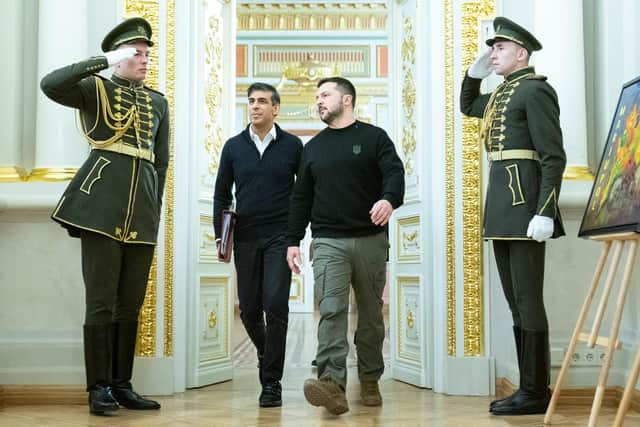The muddy situation in the Ukraine-Russia war leaves the conflict on a knife-edge - Patrick Mercer
Tanks sank in it, gun platforms wallowed in it and even light aircraft couldn’t take off in it.
Well, nothing’s changed and both sides know that they’ve only got a few weeks before they, like their grandfathers, will have to bow to nature. For the Russians this is especially crucial because Mr Putin’s election - and its foregone conclusion - fall early next month when the ground will be glutinous. He’ll want some tangible victories by then and those have already started with the fall of Avdivka a few days ago.
Advertisement
Hide AdAdvertisement
Hide AdNow, don’t be fooled by the West’s coverage of this, most of which brushes this Russian success aside. Avdivka was probably the most highly fortified strongpoint to be assaulted so far and, whilst it took time and cost Moscow dear, the inhabitants of Donetsk can no longer be bombarded from this great earthwork.


Tactically it’s highly important; it’s hugely symbolic to the Donetsk people and it’s a defeat that President Zelensky desperately wanted to avoid.
Meanwhile, about 200,000 fresh, Russian troops are massing across the front lines. But, will there be time to deploy them before the Russian elections and the season’s muddy clock runs down? Better still for Moscow, might internal difficulties in Kiev mean that these troops may not need to fight at all?
One school of thought suggests that the replacement of the very popular General Zalushny by General Syrsky as Ukraine’s military boss leaves the former officer free for political manoeuvres against President Zelensky.
Advertisement
Hide AdAdvertisement
Hide AdWhen this is combined with a dreadful impasse in Washington about more military aid for Kiev, the political situation in Kiev begins to look very fragile.
And something else ominous has happened.
As the defence of Avdivka started to totter, one of the reinforcing units that Kiev sent forward was the 3rd Assault Brigade - the thinly disguised Azov Regiment. Now, these are the far right political/military group who have been central to much of the muscular, nationalist rhetoric so hated by Moscow. It’s probably fair to say that one of the Kremlin’s stated war aims, the ‘de-nazification’ of Ukraine, focuses on the Azov and similar groups.
The Azov’s creed has created tough, ideological soldiers whom the Russians have learnt to fear and when they were ordered forward to plug a gap in the line at Avdivka, there was a sharp intake of breath on both sides of the line.
The trouble was, the Brigade faltered. Rather than immediately blunting the Russian pincers that have now surrounded Avdivka, the Azov hung back not, some would say, to save their skins, but to keep themselves disengaged and ready to move towards Kiev should there be political unrest there.
Advertisement
Hide AdAdvertisement
Hide AdNow, exactly what caused the Azov Regiment to swerve is as yet unclear. If it was politically motivated rather than simple pusillanimity, the new General and, indeed, the President need to be very worried.
This meant that the Munich Security Conference - which has just concluded - was an uncomfortable time for not just Mr Zelensky, but the alliance as a whole.
The death of Alexei Navalny signalled that the last hope of a powerful Russian opposition had perished, there was no sign of more US money being made available and Avdivka fell. All the while, the subtext of most of the speeches was that something had to be done quickly before the probable election of Donald Trump in the autumn.
Now, despite his rhetoric, quite what Mr Trump’s attitude towards Ukraine herself might be is not yet clear, but what is obvious is that a Trumpian administration will have little time for NATO countries who fail to increase their defence spending or who - like Britain - cut their combat power.
Advertisement
Hide AdAdvertisement
Hide AdIndeed, it was clear from the speech by NATO’s Secretary General that the future of the whole alliance could well be in jeopardy if Donald Trump triumphs.
All this when combined with the tensions in Bankova Street (Kiev’s Westminster) must have given Mr Zelensky some sleepless nights.
But, if the mud comes soon and Russia fails to capitalise on the momentum she should have gained once Avdivka fell, there’ll be time for America to solve her political wranglings and to get the help and money to where it’s needed in Ukraine. And, counter intuitively, the West’s political disarray may help to buy Kiev some vital time.
Certainly, Russia is now well placed to push home her advantage against a much weakened Ukraine. But, there’ll be nothing like a sweeping offensive by Moscow to harden Western resolve. A threat to the very existence of Ukraine and signs that the last two years’ blood and anguish have been entirely in vain may yet be Mr Zelensky’s salvation.
Advertisement
Hide AdAdvertisement
Hide AdYou can see why Hitler’s men, all those years ago, longed for the snow to melt and Ukraine’s black soil to turn to treacle. It was their ally and it might now also become Kiev’s greatest friend.
But, whilst it may guarantee some elbow room, unless the West sees the imminent danger and produces aid and political unity in very short order, Mr Putin may well be looking forward to a triumphant spring followed by a victorious summer.
Patrick Mercer is a former MP for Newark and Army colonel.
Comment Guidelines
National World encourages reader discussion on our stories. User feedback, insights and back-and-forth exchanges add a rich layer of context to reporting. Please review our Community Guidelines before commenting.